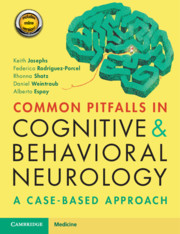Book contents
- Common Pitfalls in Cognitive and Behavioral Neurology
- Common Pitfalls in Cognitive and Behavioral Neurology
- Copyright page
- Dedication
- Contents
- Diseases Discussed in the Book
- Preface
- Acknowledgements
- Abbreviations
- Part 1 Missing the Diagnosis Altogether
- Part 2 Misidentifying the Impaired Cognitive Domain
- Part 3 Missing Important Clues in the History
- Part 4 Failure of Pattern Recognition
- Part 5 Difficult-to-Characterize Cognitive/Behavioral Disorders
- Part 6 Clinical Findings That Are Subtle
- Part 7 Misinterpreting Test Results
- Part 8 Attributing Findings to a Known or Suspected Disorder
- Part 9 Missing Radiographic Clues
- Part 10 Management Misadventures
- Case 46 I Don’t Know When to Stop
- Case 47 Is It Still Helping?
- Case 48 Caring for the Caregiver
- Case 49 Better Safe than Sorry?
- Case 50 Great Expectations
- Case 51 Nothing Can Be Done
- Index
- Plate Section (PDF Only)
- References
Case 47 - Is It Still Helping?
from Part 10 - Management Misadventures
Published online by Cambridge University Press: 03 November 2020
- Common Pitfalls in Cognitive and Behavioral Neurology
- Common Pitfalls in Cognitive and Behavioral Neurology
- Copyright page
- Dedication
- Contents
- Diseases Discussed in the Book
- Preface
- Acknowledgements
- Abbreviations
- Part 1 Missing the Diagnosis Altogether
- Part 2 Misidentifying the Impaired Cognitive Domain
- Part 3 Missing Important Clues in the History
- Part 4 Failure of Pattern Recognition
- Part 5 Difficult-to-Characterize Cognitive/Behavioral Disorders
- Part 6 Clinical Findings That Are Subtle
- Part 7 Misinterpreting Test Results
- Part 8 Attributing Findings to a Known or Suspected Disorder
- Part 9 Missing Radiographic Clues
- Part 10 Management Misadventures
- Case 46 I Don’t Know When to Stop
- Case 47 Is It Still Helping?
- Case 48 Caring for the Caregiver
- Case 49 Better Safe than Sorry?
- Case 50 Great Expectations
- Case 51 Nothing Can Be Done
- Index
- Plate Section (PDF Only)
- References
Summary
This 76-year-old man returned to the clinic, brought by his daughter for monitoring of his progressive memory impairment. Five years previously, neuropsychological evaluation revealed memory encoding deficits and brain MRI showed asymmetric hippocampal atrophy. With a diagnosis of probable Alzheimer disease, he was started on rivastigmine, gradually increased to a dose of 6 mg BID. The family noticed better thinking and less forgetfulness for six months, but he continued to decline thereafter. He went on to have difficulty dressing and bathing and experienced delusions of theft. After five years of treatment with rivastigmine, his daughter wondered if it should be discontinued.
- Type
- Chapter
- Information
- Common Pitfalls in Cognitive and Behavioral NeurologyA Case-Based Approach, pp. 153 - 154Publisher: Cambridge University PressPrint publication year: 2020



